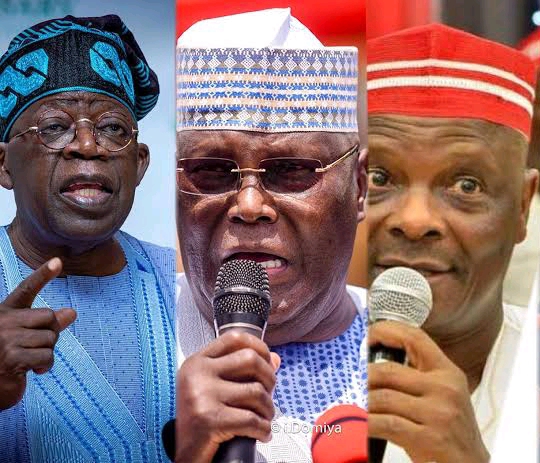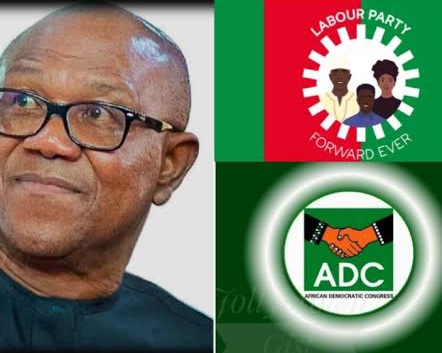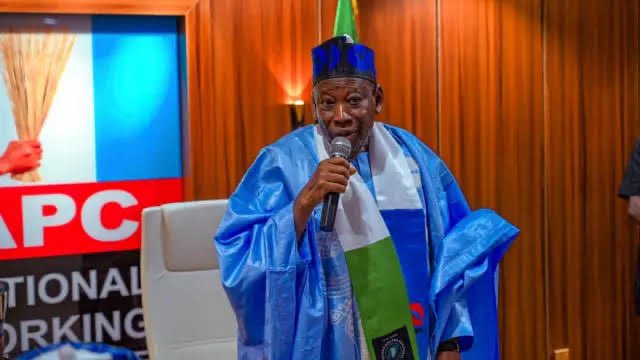Isaac Samuel
The death of former President Muhammadu Buhari has thrown open a fresh contest for his long-courted northern political base, with President Bola Tinubu, former Vice President Atiku Abubakar, and NNPP leader Rabiu Kwankwaso all moving to court the millions of grassroots voters once loyal to the Daura-born general.
Buhari, whose rallies drew unprecedented crowds and whose austere appeal delivered a reliable 12 million votes across decades, had served as the North’s political compass for over 20 years.
With his passing, the All Progressives Congress (APC) faces mounting pressure to retain its hold on the region, where Buhari’s influence had kept its disparate blocs united.
Political observers believe Buhari’s death is not only the end of an era but the start of a fierce struggle for his northern political inheritance.
For the first time in 22 years, the North will march toward a general election in 2027 without the Daura-born general, a figure whose presence, whether on the ballot or as a kingmaker, anchored northern conservatism and shaped national contests.
The death of the former president elicited reactions, with most of them, tainted with emotions. To ordinary Nigerians, a former leader passed away, but to those in the political circle, Buhari’s death means something different.
To observers, Buhari’s death among the political ranks must have reignited so many questions and changed about the survival of the bloc he once commanded: the defunct Congress for Progressive Change (CPC), which is the smallest of the four parties that merged to form the ruling All Progressives Congress (APC) in 2013 but the one with the most emotional connection to the northern grassroots, particularly the ‘talakawa.’
Already, there are fears that more of the loyalists of the late former president dump the APC ahead of the 2027 general elections.
A source who spoke to this medium on the condition of anonymity said the development is causing jittery among the party faithfuls.
The source who hails from the Northwest said: “Immediately former president Buhari was pronounced dead, I called a friend who is also a member of the party. He said in his words ‘wahala dy’ o. He doesn’t really want to talk about it further because of respect for the dead. Let me tell you, we all know there is trouble as many people are still in the APC because of the respect they have for Buhari. I can tell you this. I hope President Tinubu can effectively manage this current situation”.
For two decades, Buhari was more than a politician, he was a political compass. His rallies drew millions, his ascetic lifestyle appealed to the poor, and his name alone secured millions of votes even in defeat.
In 2003, Buhari polled 12,710,022 million votes against Olusegun Obasanjo. In 2007, his tally was 6.6 million. By 2011, running under the CPC, he won 12.2 million votes despite the party holding only one state. His 2015 triumph, where he amassed 15.4 million votes, was built largely on this grassroots fervour.
Now, with Buhari gone, that wellspring of loyalty has no natural custodian and his 12 million votes bank has now become a beautiful bride to fight for between the ruling All Progressives Congress and opposition political forces including the late president’s allies who are at odds with President Bola Tinubu.
But the controversy about Buhari’s 12 million votes bank and his relevance to electoral outcomes didn’t start when he died. Just few days before the late president passed away, Boss Mustapha, former Secretary to the Government of the Federation, reignited a debate by dismissed claims that President Tinubu made former President Muhammadu Buhari Nigeria’s president in 2015.
Speaking during the launch of Garba Shehu’s book, ‘According to the President: Lessons From A Presidential Spokesman’s Experience,’ the ex-SGF claimed that Buhari alone contributed “12 million votes” before the APC merger added another three million.
He explained that Buhari was already famous and had over 12 million votes in his kitty before the 2015 election
“The merger of the legacy parties merely contributed three million votes to his victory at the 2015 presidential election”, he said.
However, Special Adviser to President Bola Tinubu on Information and Strategy, Bayo Onanuga, strongly refuted Mustapha’s claims suggesting that Tinubu played no decisive role in Muhammadu Buhari’s rise to the presidency in 2015.
Onanuga clarified that Mustapha’s comments at a public event had been misrepresented, adding that anyone familiar with the political dynamics of 2015 would understand Tinubu’s central role in Buhari’s eventual victory.
Onanuga stated, “Without Bola Tinubu, there was no way we would have had a Buhari presidency in Nigeria.”
Within the APC, the old CPC bloc remains sizable but divided. Loyalists such as former Nasarawa Governor Tanko Al-Makura, Katsina Governor Dikko Radda, NDLEA Chairman Gen. Buba Marwa (rtd), former Speaker Aminu Bello Masari, Nasarawa Governor Abdullahi Sule, and North-West APC Vice Chairman Garuba Datti have pledged loyalty to President Tinubu.
In April 2025, just months before Buhari’s death, Al-Makura, Masari, and 21 others convened to publicly affirm their commitment to Tinubu, even as defections by former Kaduna Governor Nasir El-Rufai and ex-Attorney-General Abubakar Malami rattled the camp.
But beneath the pledges, a leadership tussle brews. Al-Makura and Prof. Muhammad Kailani, Director-General of the Confederation of APC Support Groups, are both vying to lead the CPC remnant.
Katsina’s Dikko Radda, Marwa, and even Buhari’s 2011 running mate, Pastor Tunde Bakare, are being floated as potential rallying figures. Observers noted that without Buhari’s patriarchal oversight, the bloc risks splintering into factions with some aligning with Tinubu, others eyeing opposition platforms just like the recent events that have played out prior to Buhari’s death.
Indeed, President Tinubu, aware of the stakes, has moved swiftly to court the Buhari family and CPC faithful.
His attendance at Buhari’s funeral, the special Federal Executive Council (FEC) session held in Buhari’s honour, and his sustained contact with Aisha Buhari have been read by observers as a bid to consolidate the northern base.
Opposition parties, particularly the African Democratic Congress (ADC), have accused Tinubu of exploiting Buhari’s death as political theatre, a charge the Presidency, through Special Adviser, Media & Public Communication/Spokesperson to President Bola Tinubu, Sunday Dare, dismissed as shameless politicking by those dancing on Buhari’s grave for relevance.
Also, some view the recent appointment of seven northerners including Muhammad Babangida, son of former military dictator, Ibrahim Babangida has a strategy by the President to regain the trust of northern Nigerians who have for months faulted his appointments for being lopsided and in violation of the federal character principle outlined in the constitution.
Yet, beyond optics, analysts are saying that Tinubu faces the hard question on whether the President can convert Buhari’s personal following, built on austerity, perceived integrity, and decades of emotional investment into institutional APC loyalty?
Indeed, what is certain is that Buhari’s death has unmoored the northern political compass. For APC, holding the North without Buhari’s aura will require more than sympathy visits and federal appointments.
Furthermore, without a Buhari endorsement, northern voters, long courted by Atiku Abubakar (PDP), Rabiu Kwankwaso (NNPP), and now a resurgent SDP-ADC alliance, may become more fluid than at any time since 1999.
This is based on the indication that the ‘talakawa’ vote, once reliably mobilised by Buhari’s mere presence, now finds itself politically orphaned.
Speaking on the matter, a political consultant and former Kano lawmaker, Abdulkarim Musa, told this medium that Kwankwaso, leader of the New Nigeria Peoples Party (NNPP), is best positioned to inherit Buhari’s northern base ahead of 2027.
He said “Among all the major northern figures, Kwankwaso has the deepest grassroots machinery, particularly in Kano and across the North-West. The Kwankwasiyya movement speaks directly to the same talakawa Buhari inspired — the poor, the market traders, the farmers. With Buhari gone, these voters are looking for someone they can touch and feel, not just hear about from Abuja.”
Musa added that APC’s challenge is that Tinubu does not command the same emotional loyalty and that, unless the ruling party delivers concrete economic relief and security gains before 2027, Kwankwaso’s populism could peel away millions of Buhari’s old supporters.
A media executive and public affairs analyst,
Julius Adegunna maintained that indeed Tinubu may not find things easy in the North following Buhari’s death.
He stated, “It may make things tougher for President Bola Ahmed Tinubu in his efforts to win the hearts of the north in 2027.
“This is because the late ex-President Muhammadu Buhari would have been able to stand in the gap and mobilise for him where things would have proved difficult.
“As things are now, the political weight, personality and influence of Mr. President will be tested. Of course, as an acknowledged political grandmaster, we will be seeing how he weathers the storm.
“This is not enough to write President Tinubu off in the scheme of politics in the north. Being a grassroots person, he still has many of his faithful in that part of the country
A public affairs commentator, Herbert, said President Bola Tinubu as an incumbent president under APC received the presidency from Buhari, therefore may inherit some of Buhari’s 12 million block votes, depending on his performance and connection with North.
Ekechukwu observed that the North under Tinubu’s administration has so far come out with strong criticisms over perceived marginalisation of the region and the alleged sidelining of Vice President Kashim Shettma.
He said this might altogether affect Tinubu’s chances in 2027.
“Abubakar Atiku, being a Northern Fulani, like the late Buhari, will attract sympathy from Buhari’s supporters and from northern irredentists, who will want power to return to the North. Atiku has been actively seeking to consolidate his northern support. His experience and knowledge of the situation and region make him a powerful contender.
“Peter Obi’s continuous rising political profile, with his message of capacity, accountability, competency, character and prudence, especially among the youth, including Buhari’s base, may have the ability to swing and share northern votes, especially in the North Central and North East.”





